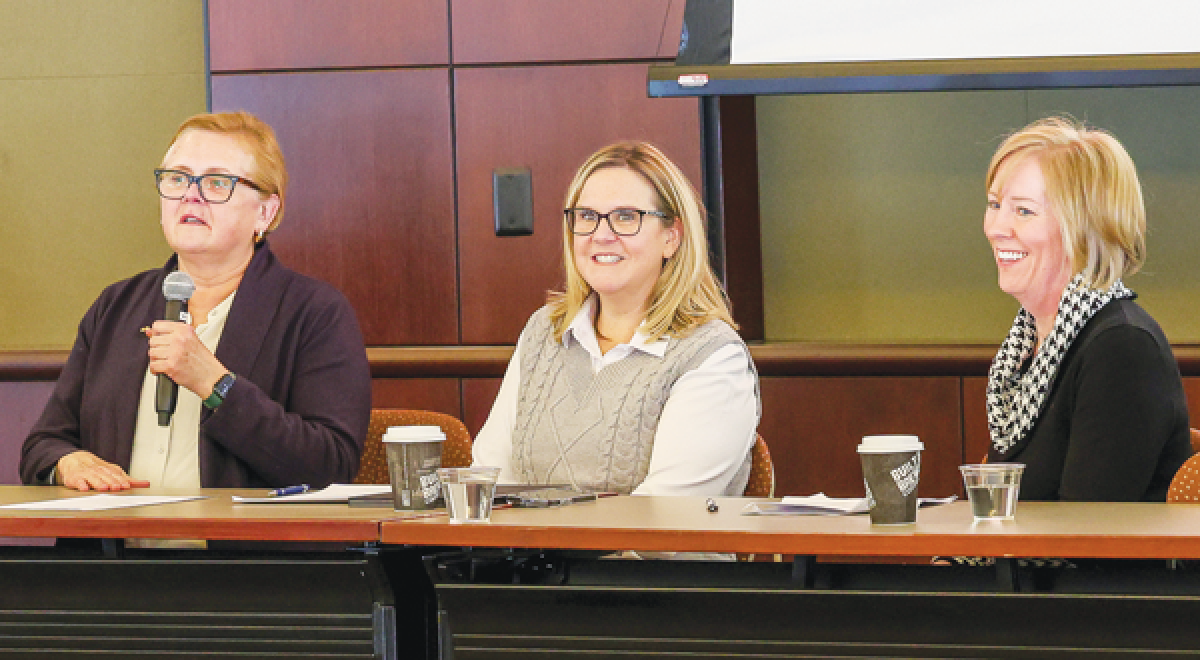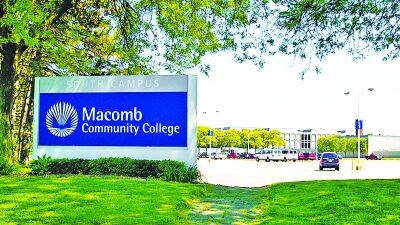CLINTON TOWNSHIP — On Feb. 18, one week before Gov. Gretchen Whitmer’s State of the State address, the Michigan Department of Labor and Economic Opportunity held a roundtable discussion in Macomb County to discuss the first-ever Statewide Workforce Plan.
Held at the University Center on the Macomb Community College Center Campus, attendees discussed the plan designed to expand career opportunities, strengthen Michigan’s workforce and support employers. There are three components of the plan: registered apprenticeships, pre-employment transition services, and removing barriers to work.
The roundtable panel included presentations from LEO Director Susan Corbin; Stephanie Beckhorn, deputy director, LEO’s Office of Employment and Training; and Heidi Devroy, CEO/founder, Prosper-Tech Machine & Tool, located in Richmond.
According to LEO, Whitmer’s proposed 2026-27 fiscal-year budget includes $19 million to expand access to registered apprenticeships; $40.4 million — including a $8.4 million general fund investment to secure $32 million in matching federal funds — for pre-employment transition support and other vocational rehabilitation services for students with disabilities; and $7.5 million for the Barrier Removal Employment Success program.
“We know that registered apprenticeships strengthen our talent pool and help Michiganders earn while they learn. One year after successfully completing their training program, registered apprentices in Michigan have median annual earnings of over $80,700,” Corbin said. “That can put a household into the middle class. One of the strong, clear priorities and goals of our Statewide Workforce Plan is to bring 75,000 additional households into the middle class. We also know that 94% of apprentices are retained in employment one year after completing their apprenticeship program.”
The $19 million is expected to expand registered apprenticeship opportunities in traditional and nontraditional industries. According to the panel, that will strengthen Michigan’s talent pool of students and job seekers by helping them to gain in-demand skills and provide employers with the workers they need.
An apprenticeship program trains future employees to become skilled in a trade or profession. Apprenticeship training combines classroom learning with hands-on work as students prepare for entry level patient-centered or business-oriented health careers.
“Registered apprenticeships are an opportunity to learn important skills that lead to industry-recognized credentials while getting paid,” Beckhorn said. “You earn and you learn at the same time. They are pathways into good paying jobs. We currently have more than 850 active programs and over 22,000 active registered apprentices in our state.”
The $40.4 million for pre-employment transition support will provide academic remediation, specialized tutoring and enrollment into career and technical training courses or college, with the goal of assisting individuals with disabilities on a pathway to in-demand jobs. The $8.4 million general fund investment will allow the state to provide the required match to access federal vocational rehabilitation funding. Michigan’s pre-employment transition services for students with disabilities are provided through the state’s vocational rehab programs, which includes Michigan Rehabilitation Services and the Bureau of Services for Blind Persons.
The $7.5 million for the Barrier Removal Employment Success program is for no- and low-income residents, including those who earn above the poverty level but not enough to adequately sustain a household. This service will address transportation, legal services, childcare, clothing needs, tools for work and other barriers that keep people from participating in the workforce. The goal is to lift 100,000 families out of working poverty during the next five years.
“The governor’s proposed budget will allow us to work closely with over 8,000 students aged 14 and older to help them with their transition from high school to post-secondary education into employment,” Beckhorn said.
Devroy, whose husband is an apprentice, said Prosper-Tech Machine & Tool began 18 years ago. The production machine company staffs 24 employees and began an apprenticeship program in 2017. They have four children, one of whom is a journeyman electrician.
“I’m a big proponent of the skilled trades. We lived off them, my family, our son and now our company has a very thriving apprenticeship program. At Prosper-Tech, we believe it’s important to teach the trade to the next generation. We need younger people to come in and do this type of work,” Devroy said.
“That’s why we became a registered apprenticeship employer through the Department of Labor. I’ve seen firsthand how offering opportunity gives career advancement and higher wages,” Devroy said. “They’re more likely to retain employment. Also, they hold a nationwide certificate. We’re on our six apprentices now. An apprenticeship program is four years but takes 10 years to become an expert.”
Beckhorn addressed how the funding will be distributed under the Statewide Workforce Plan.
“We’re held to requirements with the state dollars. We will put out competitive grants or requests for proposals. Sometimes we may start with a request for information. We do want these to be high wage, high demand jobs. We want to invest where there are quality jobs that pay good wages, that have benefits such as health care, retirement benefits,” Beckhorn said. “We’re going to invest it where the data says we need more direct care workers and more advanced manufacturing. We’re working here with Macomb (County) with the Department of Defense, particularly the (maritime) industrial bases.”
Tatjana T. Savich and her brother, Alex Savich, attended the roundtable discussion. Alex Savich is the owner of Angelica’s Place, an assisted living facility in Romeo. Tatijana Savich is the CEO and owner of Quality Care Rehab & Autism Center, with locations in Shelby Township and Clinton Township, and Divinity Homecare in Clinton Township. Between the three companies, there are 32 apprenticeships in five different areas. While there are many associate apprenticeships with manufacturing, Tatjana Savich said the health care field is in need of them, too.
“We’ve already had several people complete their apprenticeship, and it’s really been wonderful,” Tatjana Savich said. “Many of the team members are now looking at getting an associate’s degree, getting a bachelor’s degree because they never thought they could do it. They never had the support, but they do have the support.”
 Publication select ▼
Publication select ▼























